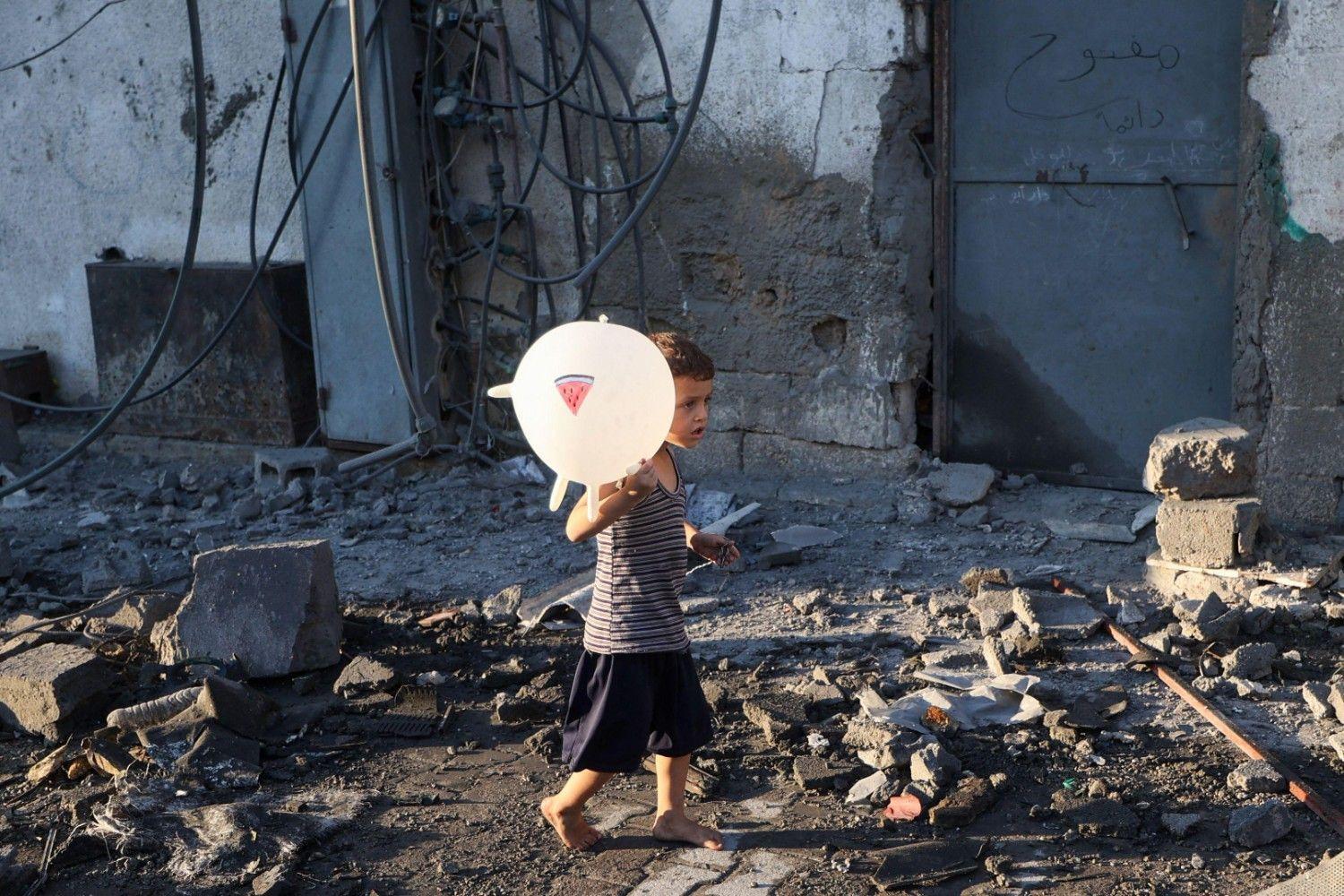
A Palestinian boy walks past debris after an Israeli strike on the Bureij refugee camp in the central Gaza Strip on July 23, 2025. (AFP)
Israel hit back on Wednesday at growing international criticism that it was behind chronic food shortages in Gaza, instead accusing Hamas of deliberately creating a humanitarian crisis as famine-related deaths rise in the Palestinian territory.
According to health officials, at least 10 more Palestinians have died from starvation in Gaza.
The latest starvation deaths bring the total number of deaths from malnutrition to 111 since Israel's war began in October 2023, with the majority occurring in recent weeks.
More than 100 aid and human rights groups said earlier Wednesday that "mass starvation" was spreading in the Gaza Strip, while France warned of a growing "risk of famine" caused by "the blockade imposed by Israel."
The head of the World Health Organization also weighed in, saying that a "large proportion of the population of Gaza is starving."
"I don't know what you would call it other than mass starvation—and it's man-made," Tedros Adhanom Ghebreyesus told reporters.
But an Israeli government spokesman, David Mencer, said there was "no famine caused by Israel. There is a man-made shortage engineered by Hamas."
An organization backed by the United States and Israel, the Gaza Humanitarian Foundation (GHF), began distributing aid in Gaza in May as Israel eased a two-month total blockade, effectively sidelining the longstanding U.N.-led system.
Aid agencies have said permissions from Israel were still limited, and coordination to safely move trucks to where they are needed was a major challenge in an active war zone.
'Torment'
The United States, meanwhile, said its top Middle East envoy was heading to Europe for talks on a possible Gaza ceasefire and an aid corridor, raising hopes of a breakthrough after more than two weeks of negotiations.
With no let-up in deadly Israeli strikes across the territory, getting aid to the more than two million people who need it has become a key issue in the conflict, and doctors and aid agencies have reported increasing cases of malnutrition and starvation.
The humanitarian organizations said in a joint statement that warehouses with tons of supplies were sitting untouched, while people were "trapped in a cycle of hope and heartbreak, waiting for assistance and ceasefires."
"It is not just physical torment but psychological. Survival is dangled like a mirage," they added.
The 111 signatories, including Doctors Without Borders (MSF), Save the Children, and Oxfam, called for an immediate negotiated ceasefire, the opening of all land crossings, and the free flow of aid through U.N.-led mechanisms.
In New York, the Committee to Protect Journalists added its voice to the appeal, accusing Israel of "starving Gazan journalists into silence," after AFP reporters in Gaza said they were all affected by the lack of food.
In Khan Younis, in Gaza's south, residents told AFP how they battled to get food aid, with one man calling it "a catastrophic scene and a real famine."
The U.N. said on Tuesday that Israeli forces had killed more than 1,000 Palestinians trying to get aid since late May, most near GHF sites.
GHF and Israel have accused Hamas of firing on civilians.
Even after Israel began easing its aid blockade in late May, Gaza's population is still suffering extreme scarcities.
GHF said the U.N., which refuses to work with it over neutrality concerns, had "a capacity and operational problem" and called for "more collaboration" to deliver life-saving aid.
COGAT, an Israeli defense ministry body overseeing civil affairs in the Palestinian territories, said the "main obstacle to maintaining a consistent flow of humanitarian aid" was a "collection bottleneck" that it blamed on international organizations.
Hamas confirms it responded to latest truce proposal
Hamas confirmed on Thursday that it has responded to an Israeli proposal for a 60-day ceasefire in Gaza after more than two weeks of indirect talks in Qatar have failed to yield a truce.
"Hamas has just submitted its response and that of the Palestinian factions to the ceasefire proposal to the mediators," the Palestinian militant group said in a statement on Telegram.
The response included proposed amendments to clauses on the entry of aid, maps of areas from which the Israeli army should withdraw, and guarantees on securing a permanent end to the war, according to a Palestinian source familiar with ongoing talks in Doha.
Negotiators from both sides have been holding indirect talks in Doha with mediators in an attempt to reach an agreement on a truce deal that would see the release of Israeli hostages.
But the talks have dragged on for more than two weeks without a breakthrough, with each side blaming the other for refusing to budge on their key demands.
For Israel, dismantling Hamas's military and governing capabilities is non-negotiable, while Hamas demands firm guarantees on a lasting truce, a full withdrawal of Israeli troops, and the free flow of aid into Gaza.